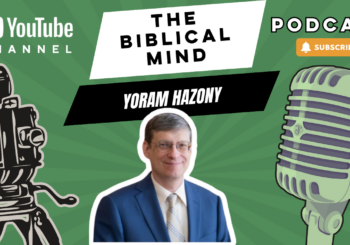Ecclesiastes Illuminates the Secret of Joy in a Dark World
In 1695, the Dutch painter Ludolf Backhuysen painted a storm at sea. The upper two-thirds of the picture are almost completely covered in swirling gray clouds. The bottom third is filled with dark, chaotic waves. And at the painting’s focal point, a small fishing boat struggles to stay afloat; several occupants are gesturing helplessly.
Yet for all the darkness that fills the canvas, the painting is actually a portrait of peace. A single spot of sunlight breaks through the clouds to illuminate one person in the back of the boat. The painting is Christ in the Storm on the Sea of Galilee. It captures the moment Jesus woke at the disciples’ cry for help (Mark 4:35–41).
Enjoying this article? Read more from The Biblical Mind.
Backhuysen’s painting reminds us: a work of art may devote most of its strokes to depicting the darkness, but that does not mean its theme is darkness.
The Book of Ecclesiastes is like Backhuysen’s painting. Ecclesiastes is also filled with dark hues. “Vanity of vanities,” the book’s opening poem begins, “all is vanity” (1:2). But vanity is not the book’s theme—joy is. The book’s author is a “Preacher of Joy,” to borrow Norman Whybray’s description.1Norman Whybray, “Qoheleth, Preacher of Joy,” JSOT 23 (1982), 87–98.
Ecclesiastes delivers a message of joy into our lives in a world storm-tossed by vanities.
A Chorus of Joy in Ecclesiastes
Many commentators regard Ecclesiastes as a book of pessimism, even nihilism. This is understandable. It is impossible to miss the despair that fills its pages. But against that backdrop, the book’s defining feature is its call to joy repeated six times.
Framed by a prologue (1:1–18) and an epilogue (11:9–12:14), the body of the book is grouped into six examinations of life’s vanity (2:1–26; 3:1–15; 3:16–6:9; 6:10–8:15; 8:16–9:10; 9:11–11:8). Each of those six sections explores another arena of life’s intractable vanities, admitting their frustrations. Nevertheless, each study ends with a call to rejoice anyhow. Here are those six climactic exhortations:
- “There is nothing better for a person than that he should eat and drink and find enjoyment in his toil. This also, I saw, is from the hand of God . . .” (2:24–26)
- “There is nothing better for them than to be joyful and to do good as long as they live; also that everyone should eat and drink and take pleasure in all his toil—this is God’s gift to man . . .” (3:12–15)
- “Behold, what I have seen to be good and fitting is to eat and drink and find enjoyment in all the toil with which one toils under the sun the few days of his life that God has given him . . .” (5:18–20)
- “I commend joy, for man has no good thing under the sun but to eat and drink and be joyful, for this will go with him in his toil through the days of his life that God has given him under the sun.” (8:15)
- “Go, eat your bread with joy, and drink your wine with a merry heart, for God has already approved what you do . . .” (9:7–10)
- “If a person lives many years, let him rejoice in them all. . . . Rejoice, O young man . . .” (11:8–12:7)
The repeated formula “eat and drink with joy” is an exhortation to take joy in the fruits of one’s labor, whether great or meager. To “eat and drink” from one’s toil can mean feasting—when fruits are abundant. But in a context discussing life’s vanities, the term expresses the paucity of fruits received. The ability to rejoice even in meager fruits is itself, as the chorus repeats, “a gift of God.”
How can this be, that God bestows a gift of joy to his people amid the poverty of life’s brokenness?
The Problem of Vanity
To appreciate the message of joy in Ecclesiastes, it is important also to understand the problem of vanity which the book confronts. In English, “vanity” typically means “emptiness, or a lack of value.” But the Hebrew term has a different connotation. It draws on a metaphor; hebel literally means “like a vapor.” Something is “like a vapor” (hebel) when you can see it, but you can neither control it nor hold onto it.
Consider the story of Abel (Gen. 4:1–8). “Abel” is the Anglicized spelling of Hebel. His name is actually “Vanity.” But Abel was not worthless, as the English meaning of the word would imply. He was beloved of God and his parents. Yet, like a vapor, Abel slipped from his parents’ grasp. Cain killed him and he was gone. Whatever the birth name of Adam and Eve’s second son, “Vanity” is the name by which he came to be remembered because of his sudden loss.
That is what the word hebel means. And that is the problem which the Book of Ecclesiastes confronts. The book is not nihilistic. The book does not teach that life is meaningless. On the contrary, the book’s argument depends on the realization that life is of great value! Life is beautiful, which is why it is so infuriating that life too often falls apart arbitrarily.
Ecclesiastes admits the problem of life’s many vanities. But it does not leave us to despair in our plight.
The Call to Rejoice
Like Backhuysen’s painting, the book of Ecclesiastes punctuates the darkness with sunlight at just the right points. The significance of its six calls to rejoice can be appreciated with a representative look at the first, followed by attention to the book’s conclusion.
In the book’s first study of life’s vanity, the speaker (self-identified as King Solomon; 1:1) rehearses his great acquisitions of wealth (2:1–11) and his acquisitions of wisdom (2:12–16). His wealth included houses and gardens, servants and livestock, silver and gold. But when he stopped to consider these fleeting riches, “all was vanity and a striving after wind” (2:11).
Likewise, Solomon’s wisdom exceeded all others. But despite his wisdom, “What happens to the fool will happen to me also. . . . The wise dies just like the fool!” (2:15–16). Even if one escapes the many uncertainties that threaten wealth and wisdom, death ultimately snatches everything away. And “who knows whether [the one who inherits it all] will be wise or a fool?” (2:19). Perhaps all that accumulation will fall into the wrong hands.
These are truly causes to grieve—even to “hate life” (2:17). But the passage does not end in despair. Rather, this first study of life’s vanities ends with the book’s first call to rejoice anyhow:
There is nothing better for a person than that he should eat and drink and find enjoyment in his toil. This also, I saw, is from the hand of God, for apart from him who can eat or who can have enjoyment? For to the one who pleases him God has given wisdom and knowledge and joy, but to the sinner he has given the business of gathering and collecting, only to give to one who pleases God. This also is vanity and a striving after wind (2:24–26).
The author calls us to source our joy in faith that God governs the world’s order. It is the Lord who promises not to leave his world in the possession of sinners. He will ultimately bestow the world’s fruits to those honoring him. As becomes increasingly clear through the course of the book, the Lord’s final provision is only certain in the coming judgment. There are no guarantees of outcomes today. But trusting God’s justice offers a basis for joy, even while suffering present vanities.
Each of the six studies of life’s vanities and their crowning exhortations exhibit similar features, building up to the book’s conclusion.
The Call to Worship
The book’s serial calls to rejoice are summarized at the conclusion of the book. There we read, “The end of the matter; all has been heard. Fear God and keep his commandments, for this is the whole duty of man. For God will bring every deed into judgment, with every secret thing, whether good or evil” (12:13–14). Those are literally the final words of the book: “the end of the matter.”
There is no source of security in this vain world, except in faith. Confidence that God sees, that God cares, that his wisdom is at work (even when we cannot see it), and that he will one day make everything right again: this is our only basis for hope. We can cling to joy in the midst of life’s chaos, only if we trust that the Lord is going to honor our faithfulness and one day make things right. There are no quick fixes, but there is real peace in a deeply rooted faith.
The closing exhortation of the book, then, is to “fear God” and to “keep his commandments.” To “fear God” is a Hebrew idiom that means to worship him. It is through worship that a person’s heart is regularly re-centered upon the gravity and glory of God. And only confidence in his glory offers a basis for joy in the arbitrary chaos of the world as we experience it. And with that joy, we are strengthened to persevere in his ways.
Though Ecclesiastes is commonly viewed as a dark book, it actually has a bright message. And it is a timely message to rediscover today. Living in an age of pandemics, climate disruptions, social unrest, and seemingly intractable political and religious tensions, now is a good time to heed the Preacher of Joy who commands the storms.
Michael LeFebvre is the author of Ecclesiastes: Joy That Perseveres, a Devotional Commentary (Leominster, UK: Day One Publications, 2015).
End Notes
1. Norman Whybray, “Qoheleth, Preacher of Joy,” JSOT 23 (1982), 87–98.
Subscribe now to receive periodic updates from the CHT.





